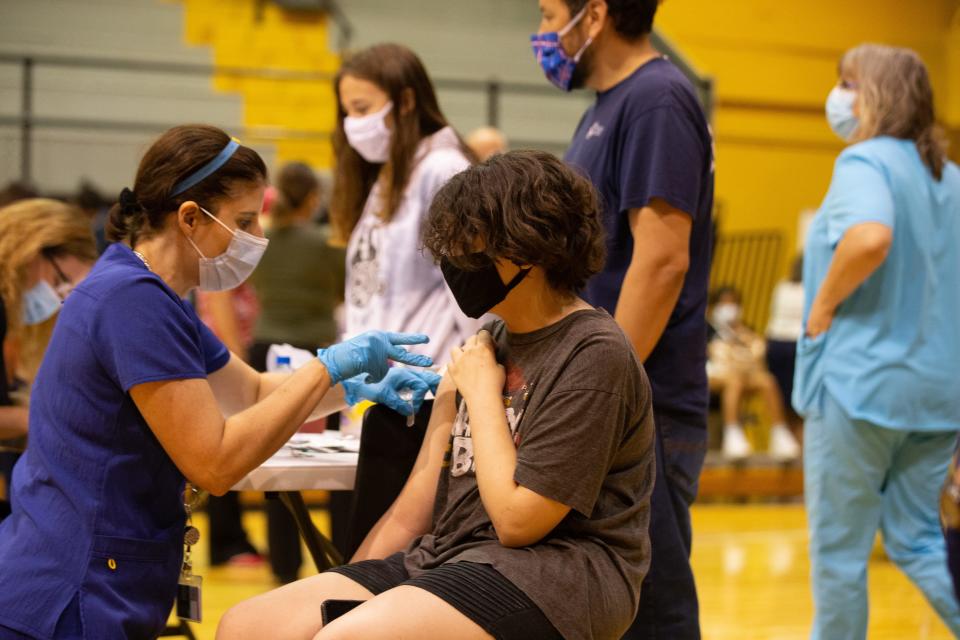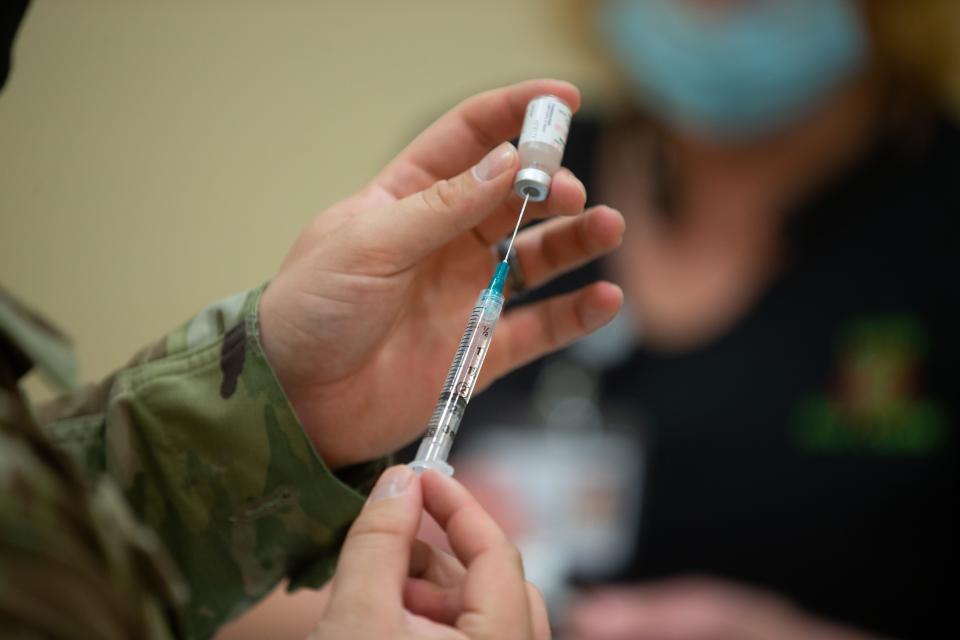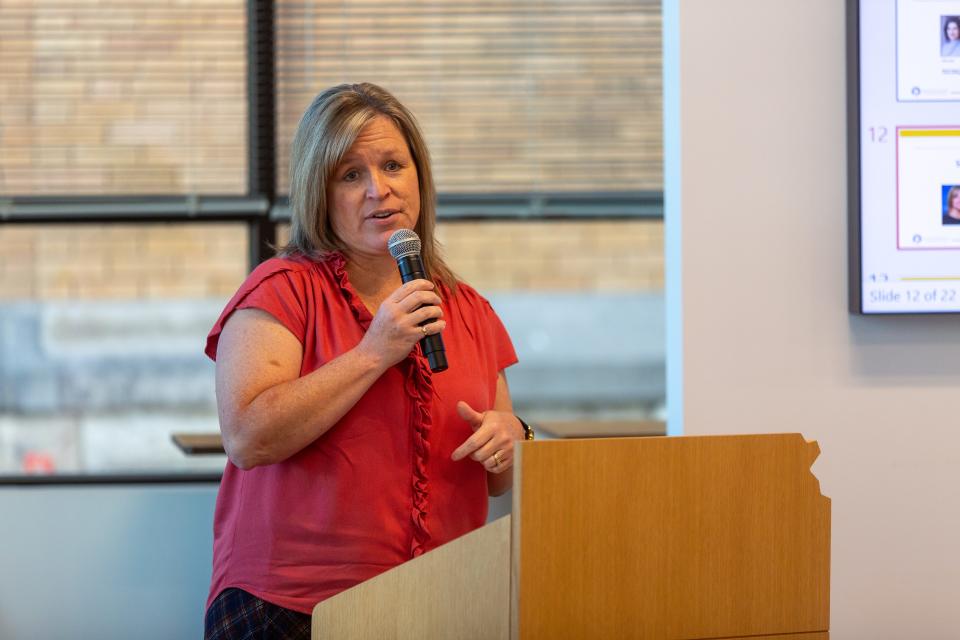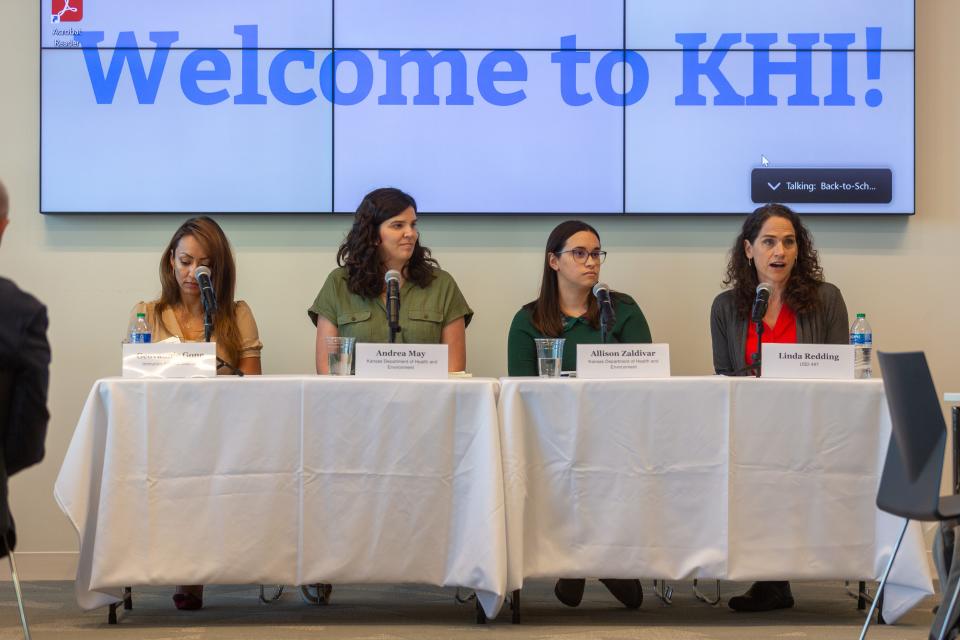As school vaccination rates trend down, KDHE doesn’t see requiring COVID shot anytime soon
- Oops!Something went wrong.Please try again later.
One of the most harrowing experiences Allison Zaldivar has ever had as a state epidemiologist was in 2018, when a spate of measles cases ripped through counties in eastern Kansas.
That outbreak stands out, Zaldivar said, because it ended up affecting a day care, where infants were at the mercy of the virus, since children that young ordinarily aren’t immunized until they reach 12 months of age.
Several factors led to the severity of the outbreak that year, but one was delayed reporting.
“That just exemplified the importance of vaccines to becoming immunized to protect those who cannot be vaccinated,” the senior epidemiologist at the Kansas Department of Health Environment told attendees at a discussion hosted by the Kansas Health Institute. “By the time we’d heard about it, all of the children in the infant room had already been exposed, most of whom subsequently developed measles.”
Although a few of the infants ended up hospitalized from their cases, Zaldivar said, thankfully all recovered.
It’s outbreaks like these, especially among children, that Kansas health officials worry could increase in severity and frequency as the state’s rate of fully vaccinated students continues to slide.

COVID turned Kansas school vaccination effort ‘on its head’
Kansas, compared to neighboring states, requires more vaccines for various preventable diseases, particularly for children entering kindergarten.
Up until fall 2019, when the state reached at 89.9% kindergarten vaccination rate, required immunizations for diseases such as polio, measles, diptheria and meningitis generally seemed to be trending upward.
But after the pandemic began, anti-vaccination hysteria and misinformation turned that increasing trend around, with Kansas schools reporting an 87.2% kindergarten vaccination rate last school year.
John Eplee, a career family physician who has championed school vaccines as a representative in the Kansas House, said COVID “flipped (immunization rates) on their head.”
“We were all making great progress, and then COVID hit, and I thought this was our great opportunity,” Eplee said. “We were going to have great public health awareness, we’re going to get those rates increased, and everyone’s going to want to get not only their school-required vaccinations, but also the COVID vaccine. Well, we all know how that turned out.”
Over the past several years, several states have seen resurgent outbreaks of long-ago defeated diseases like measles and polio as vaccination rates drop.
Even a couple of percentage points are reason for concern, explained Geovannie Gone, executive director of the Immunize Kansas Coalition. Any drop in rates allows for those preventable diseases to spread far more easily, even among people who are vaccinated, since they may still be infected — albeit with milder symptoms.
That poses a risk for children and other people who cannot be vaccinated for legitimate medical or religious reasons, Gone said. Generally, epidemiologists prefer to see populations reach 95% immunization, as a protection for people who simply cannot receive the vaccine.

KDHE deputy secretary: No plan to require COVID vaccine for Kansas schools
As COVID outbreaks continue to pop up from time to time, the Kansas Department of Health and Environment does not have any plans to attempt to add any COVID vaccine to the state’s slate of school-required vaccinations.
Any addition to that list would first require vetting from a committee of physicians, pediatricians, lawmakers and other stakeholders around the state, said Ashley Goss, deputy secretary for public health at KDHE. Only after that committee’s review could KDHE make a recommendation to the Kansas Legislature, which would have to make a change to state statute to change the list.
While the Centers for Disease Control and Prevention recommends states begin to require COVID vaccinations to enroll in schools, Kansas has not followed that suggestion.
COVID, when contracted by otherwise healthy children, has not usually been a severe disease. But like any other disease, the risk of greater infectiousness and spread remains when children are not vaccinated.

Still, Goss said that KDHE, similar to its approach with the annual flu vaccine, is not looking to require any COVID immunizations.
“There isn’t anything coming down the pipe, I can tell you right now, that we would be wanting to add to our school vaccine list,” Goss said. “It’s stayed the same since 2019, when I believe Dr. Eplee helped us with the last two.”
About 1 in 10 Kansas children aren’t fully immunized
In the years since the start of COVID, the number of people claiming religious exemptions from school vaccine requirements has generally increased.
About 2.6% of Kansas children had a religious exemption from vaccination requirements during the 2022-23 school year, compared to about 1% a decade prior.
Combined with a steady rate of medical exemptions of about three-tenths of a percentage, the exemptions, however, are still a small part of the roughly one in 10 Kansan children who aren’t getting their required vaccines. Many parents simply aren’t having their children vaccinated or seeking an exemption as allowed by law.
Andrea May, an advanced epidemiologist at KDHE, said much of the drop may have come because of the early days of COVID when schools were not held in-person or had other priorities.
While Kansas schools are required by law to have parents present valid immunization records at enrollment, many have waiver periods to allow families to come into compliance.

During COVID, some school districts became more lax in actually enforcing that immunization requirement, May said.
“I don’t think that COVID helped us, in terms of trying to help parents vaccinate their children,” said Linda Redding, the health services coordinator at Lawrence USD 497. “We’re seeing a lot more waivers come through in our schools for exemption.”
Eplee: Antivaccine forces lose sight of severity of disease
Part of KDHE’s work in the coming months will be to better understand the reasons, challenges and barriers Kansas parents are facing in vaccinating or not vaccinating their children, May said.
As part of their statewide efforts, Immunize Kansas has worked closely with school districts and local health departments to increase awareness of the benefits of vaccinations, particularly in vulnerable communities of recent immigrants and agricultural migrants, said Gone, of Immunize Kansas.
“We go there, we talk to the families about vaccines, and something we’ve found to be very meaningful is we talk to them about the disease it prevents,” the executive director said. “Many of them go to the health department, and get vaccines administered for their kids, but they don’t really understand the diseases they’re preventing.”
More: Gov. Laura Kelly rejects bill to limit public health powers, COVID-19 vaccine requirement
One path forward could be to create a more standardized approach for school districts to exclude unvaccinated students from classes, the health experts said. Policies and enforcement are very inconsistent, even though schools are required to keep unvaccinated students out of school.
That would put the onus on parents to comply, Gone said, and coupled with strategic immunization efforts from local school districts and health departments, immunization could be a much easier and convenient process for students and parents.
She pointed to an example of a school district that teamed up with a county health department to provide on-site vaccination services at school registration.
“Parents may be taking the day off of work already, and many may have financial restraints that don’t allow them to take two days off to get their kids vaccines,” she said. “But if they’re there, they will wait and they will get their kids vaccinated.”
Still, better and coordinated efforts are needed at the state level to improve Kansas students’ vaccination rates, said Eplee, the Atchison Republican.
More: Kansas 'not planning' to require COVID-19 vaccine for school attendance, despite CDC move
While the health providers have an ally in him as he advocates for immunizations in the Kansas Statehouse, Eplee admitted that antivaccine forces “are as strong as ever.”
“We lose sight of why we give these vaccinations,” the longtime physician said. “This is something we can’t underscore enough. These diseases kill people. They maim people. They cause mortality and morbidity, as we say in our business. They’re serious. When you’ve seen people die of measles or a couple people die of meningitis, it permanently gets your attention.
“We are victims of our own success, because we don’t see these diseases, and until you have a measles outbreak, people don’t get fired up to get the vaccinations.”
Rafael Garcia is an education reporter for the Topeka Capital-Journal. He can be reached at rgarcia@cjonline.com or by phone at 785-289-5325. Follow him on Twitter at @byRafaelGarcia.
This article originally appeared on Topeka Capital-Journal: Kansas school immunization requirements aren't driving vaccinations

